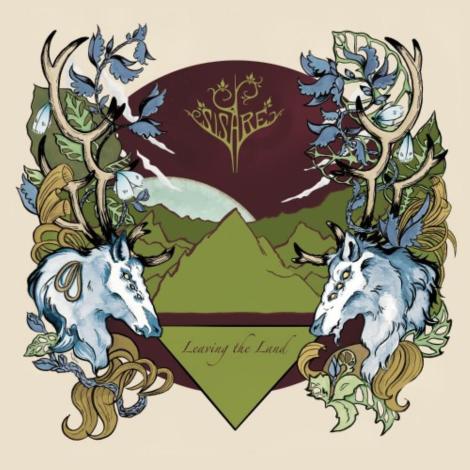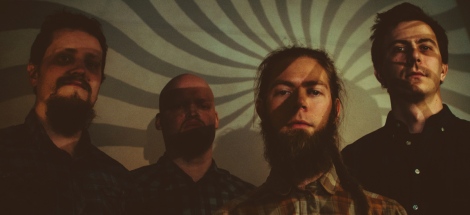

I typically uphold the adage that you can’t judge books (or albums) by their covers, but the dreamlike artwork for Sisare’s Leaving the Land perfectly matches the ambiance of its contents. An experimental progressive rock/post-metal quartet from Turku, Finland, Sisare originally formed in 2008 with both feet firmly planted in the progressive death metal camp. After releasing several EPs in that genre, they transitioned to a more melodic – albeit still dark – style of writing, an approach that incorporates a lot of folk and post-metal elements, not unlike Opeth’s Heritage or Pale Communion. The rich atmosphere and orchestration blend dynamics with creative song structures and quite a bit of edge.
Released 18 January, the band’s sophomore release follows on the heels of 2013’s Nature’s Despair, thematically diving into melancholy themes of imagined realities. As per their own description, their material recounts tales of alternate realities, taking “imaginary voyages to alternative forms of life and… deep journeys into a human mind,” creating contrast with life as we know it. The rich lyrics on Leaving the Land, though somewhat skewed by the fact that English is a second language for these musicians, portray two types of imaginary worlds: those that suffer not unlike our own, and those fantastical places that cast our sad reality in stark contrast.
The band’s post-2010 lineup consists of Severi Peura (vocals, guitars), Timo Lehtonen (guitars) and Hermanni Piltti (bass), and Rauli Elenius (drums). I particularly appreciate the guitar work of Peura and Lehtonen on this record, which varies in style from spacey art rock to pentatonic hard rock to grunge. Elenius and Piltti’s chemistry on percussion and low end carefully support the songs with focused intensity, always accenting tone and dynamic without overstepping. This is a band that knows how to listen to one another and, therefore, play well together.

Only six tracks long, Leaving the Land feels like the shorter part of a longer whole. At the end of every spin, I find myself thinking there should be more. “Escape” is a strong opener, demonstrating early the dark tensions of Sisare’s writing. This piece blends melodic components with dreamy vocals and themes, but maintains enough of a rock edge to propel the song into its climactic moments – big choruses, pentatonic instrumental licks. This song is a gateway into the topographic landscapes of the album’s mystical setting: “We leave the land behind / Grow our wings and free our mind / Farewell humanity / We will fly above the sea.” This departure from the realm of “Babylon,” a literary trope for a place of wickedness, is an entrance into a realm where the speaker expresses blissful independence: “We are free forever / We are flying away.”
The album’s second track, “Mountains,” begins with some post-rock atmosphere: arpeggiated guitar parts over droning bass and pensive drums. This piece bears strong kinship with Riverside material: brooding and heavy, the writing relies on extended instrumental breaks and strong guitar leads, camping out in syncopated 4/4 for its duration. Thematically, the piece is caught up with the enormous potential of each individual life: the central figure is a newborn child, representing the future and the fact that “there’s no written ending / it’s all now depending on him.” To live a life of truth and resolve, to be a difference-maker, is to be an independent human being, forging the future for himself. The stunning instrumental conclusion drives to a huge finish, echoing the sickening revelation that the youth of this story experiences – that his own people are the ones responsible for all of the suffering and victimization. His resolution is to turn away and “never fight again,” to be the first to choose peace and impact the course of history.

“Geno” was the track I first heard from Leaving the Land – technically its “single.” By itself, this piece was enough to make me seek out this album for a review. The song is a great encapsulation of the band’s strengths: tight guitar/bass riffing in clever syncopation, rich atmosphere, and powerful vocal work and interesting melodies. The band’s post-rock influences particularly shine on “Pace,” a piece that nearly reaches eight minutes and works through several internal segments. Central to this song are the past, the future, and the passage of time. The speaker evaluates the omnipresence of time, like atmosphere or oxygen around us: seemingly, we stand still on our plane of existence while the thing that is in motion are the seconds passing us by and, famously, “slipping into the future.”
The album’s final tracks, “Shattered” and the 7-minute “Perception,” both have a strong Midlake vibe throughout, especially in the vocal work. The entire album has been a quest for freedom, and the lattermost piece seems to regard perspective as the enemy of true freedom – that is, perception is the gatekeeper to be thrown down. I love the guitar work on this one, moving from atmospheric tapestries to transcribing the vocal melodies, to some extended lead, to the grinding conclusion.
I love this record. It’s got chops, hooks, arrangement, and musicianship. I’ll grant that it could easily be a forgotten album released by Riverside, Opeth, or even Tool, but it’s got enough of a post-rock feel (especially on pieces like “Pace” and “Perception”) that sets itself apart. Furthermore, the overarching concept tends to lose my attentiveness in its saccharine naivety: while the sentiment of identifying endemic problems in the human race is admirable, the theme isn’t quite fantastical enough to really feel like a fully-fleshed alternate universe, and the solutions proposed are the weary “give peace a chance” ideology. That said, I really like Sisare’s sound and the quality songs that make up this record. Leaving the Land might not solve the world’s problems, but it does make for a glorious 42-minute escape.
____________________
